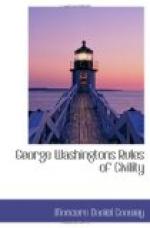[Footnote 1: George Washington and Mount Vernon. Introduction, p. xxvii.]
The Rev. James Marye’s brother-in-law, Rev. Theodosius Staige, had for a time preached in the temporary structure in which the congregation of St. George’s, Fredericksburg, met before the church was completed. It was probably during a visit to Mr. Staige that Mr. Marye made an impression on the people of that place. At any rate the early Vestry-book shows that, in 1735, the churchwardens, after the colonial custom, asked leave of the Governor of Virginia to call James Marye to their pulpit, and it was granted. He is described as “Mr. Marie of St. James,” being then officiating at St James Church, Northam Parish (Goochland county, Virginia). At what time and why he left Manakintown is not clear. He fixed his first abode eight miles out of Fredericksburg, in a place which he called “Fayetteville;” and it is not improbable that some of his Huguenot congregation had come with him, and attempted to found there a village. Several infant churches in the county (Spottsylvania), besides that of Fredericksburg, were under supervision of the Rector of St. George’s Parish.
The Rev. James Marye remained in active and successful ministry at Fredericksburg from 1735 until his death, in 1767. He founded the large Virginia family which bears his name, and which has always had eminent representatives. On his death he was succeeded in St. George’s Church, Fredericksburg, by his son of the same name, whose honourable tradition was maintained. His great-grandson, John L. Marye,—whose mansion, “Brompton,” stood on “Marye’s Heights,” so famous in the Civil War,—was an eminent lawyer; as also is a son of the latter, John L. Marye Jr., former Lieutenant-Governor of Virginia.[1]
The founder of the Virginia Maryes, who should be ranked among American worthies, was an eloquent clergyman, and built up a noble congregation in Fredericksburg. He was also an accomplished gentleman and a scholar. That he founded and taught the school is tolerably certain. The Municipal Records, as we have seen, ascribe the school a French origin. The name and condition of every respectable resident of Fredericksburg, at the time of his settling there, when it was little more than a “paper town” (in colonial phrase), is known. There was in the place no one—certainly no “Frenchman”—except Marye who could have taught a school of such importance as that at Fredericksburg. For it presently became known throughout Virginia as the chief Academy, especially for classical education, and its reputation continued for more than a hundred years.[2]
[Footnote 1: For valuable information concerning the Marye family and its descendants, see Brock’s “Huguenot Emigration to Virginia.” (Virginia Hist. Soc., Richmond, 1886.)]
[Footnote 2: In a note I have from John L. Marye (sometime Lieutenant-Governor of Virginia), he says: “As to the habit of the Parish Minister to conduct or overlook the schools, it would appear must probable that this was the case in 1745, when we remember how destitute at that era colonial society was of well-organized public or private schools (save the Tutors in families). When I entered Mr. Hanson’s school in 1834, it was the custom of Parson McGuire and some of the Vestry to attend the annual Examinations.”]




